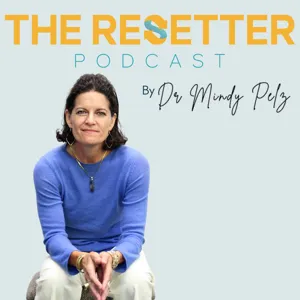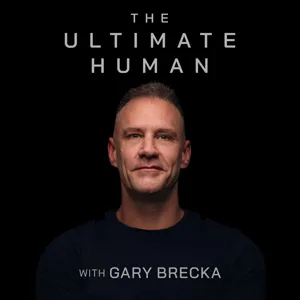Podcast Summary
Improve deep sleep for tissue repair: Avoid caffeine and alcohol, maintain a consistent sleep schedule, practice relaxation techniques to boost deep sleep and tissue repair
Deep sleep, also known as slow wave sleep, is a crucial part of the sleep cycle for bodily tissue repair. It's typically more prevalent in the first half of the night, and during this time, growth hormone is secreted. If you're having trouble increasing your deep sleep percentage, consider implementing science-backed protocols such as avoiding caffeine and alcohol before bed, maintaining a consistent sleep schedule, and practicing relaxation techniques. These methods can help improve the quality of your sleep and increase the amount of deep sleep you get each night. For more information and specific tools, check out the Huberman Lab's free sleep toolkit on their website.
Deep sleep: Essential for body repair and regeneration: Deep sleep, or slow wave sleep, is crucial for bodily tissue repair and regeneration through protein synthesis and muscle repair. It also impacts insulin and blood glucose levels during the day.
Deep sleep, also known as slow wave sleep, is a crucial part of a healthy sleep cycle. It primarily occurs in the first half of the night and is essential for the repair and regeneration of bodily tissues through processes like protein synthesis and muscle repair. Dreams during deep sleep tend to be less emotionally charged compared to those in rapid eye movement sleep. Recent studies have shown that our bodies metabolize energy differently during deep sleep, which is important for regulating insulin and blood glucose levels during the day. To ensure optimal sleep health, aim for a balanced distribution of deep sleep and rapid eye movement sleep throughout the night. However, it's important to note that sleep tracking methods, such as those using heart rate and body movement, are estimates and not definitive measurements of sleep stages. Deep sleep is vital for overall well-being and should not be overlooked.
Avoid substances and practices that disrupt slow wave sleep: Avoid caffeine, alcohol, cannabis, and heavy meals close to bedtime to enhance slow wave sleep and improve overall sleep quality.
To improve the total amount of slow wave sleep and enhance sleep quality, it's essential to avoid certain substances and practices. Firstly, abstain from consuming caffeine, alcohol, and cannabis, including THC and CBD, within eight to twelve hours of bedtime. These substances can disrupt slow wave sleep and reduce overall sleep quality. Additionally, avoiding food intake in the two hours before sleep can help increase growth hormone output and deepen slow wave sleep, but ensure you're not going to bed too hungry. These practices can significantly improve the quality and duration of your slow wave sleep.
Eating right before sleep impacts slow wave sleep: Maintain a sufficient food intake before sleep, aim for a 2-3 hour buffer between dinner and bed, exercise before dinner for better slow wave sleep, and avoid large meals right before bed.
Maintaining a sufficient food intake before sleep is essential for falling and staying asleep, while also aiming for a two to three-hour buffer between dinner and bedtime to optimize slow wave sleep. Exercise, particularly before dinner, can enhance slow wave sleep quality by increasing slow wave stability, making it a valuable addition to sleep hygiene practices. However, avoid eating large meals right before bed to prevent disruptions to slow wave sleep. Individual experiences may vary, and some people might be able to fall asleep easily on an empty stomach, especially if they're very exhausted. It's essential to listen to your body and find the right balance for your personal circumstances.
One hour of moderate exercise before bedtime enhances slow wave sleep: Exercising an hour before bedtime can improve slow wave sleep quality, reducing the risk of conditions like dementia, and avoiding caffeine and alcohol within six hours of sleep further enhances sleep quality.
Engaging in an hour of moderately intense exercise, at least six hours before bedtime, can significantly improve the quality of slow wave sleep. This improvement is not due to noticeable changes in core body temperature or caloric expenditure, but rather, it's attributed to alterations in brain wave patterns during slow wave sleep. Ensuring adequate slow wave sleep is crucial for both bodily and brain tissue repair, and this can lead to a reduction in the risk of conditions like dementia. Additionally, avoiding caffeine and alcohol within six hours of bedtime, or even better, eight to twelve hours before, can further enhance the overall quality and architecture of sleep.
Exploring supplements and behavioral tools to enhance sleep quality: Magnesium supplements, Theanine, Apogenin, and Inositol (specifically myoinositol) can improve sleep quality and shorten the time to fall asleep when taken 30-60 minutes before bed. Avoid bright light before bed and get morning sunlight to enhance sleep behaviorally.
There are various behavioral tools and supplements to improve sleep quality and shorten the latency to fall asleep. Behavioral tools include getting morning sunlight and avoiding bright light before bed. Magnesium supplements like magnesium 3 and 8 or magnesium bisglycinate, Theanine, and Apogenin form a sleep stack that can enhance sleep quality. Inositol, specifically myoinositol, is another supplement that can improve slow-wave sleep, especially for those following a low-carbohydrate diet or having trouble falling asleep due to hunger. These supplements should be taken about 30 to 60 minutes before bed and not during the day. Studies suggest that inositol can improve sleep quality and adjust sleep architecture, making it a potential candidate for enhancing slow-wave sleep.
Improve sleep quality with inositol, exercise, and avoid caffeine and alcohol: Incorporating inositol supplements, regular exercise, and avoiding caffeine and alcohol can enhance sleep quality, particularly by improving the ability to fall asleep, stay asleep, and make it easier to fall back asleep if woken up. Inositol also supports emotional repair during REM sleep and physical recovery during slow wave sleep.
Incorporating specific supplements, such as 900 milligrams of inositol, regular exercise, and avoiding caffeine and alcohol can significantly improve sleep quality. Inositol, in particular, can help enhance the ability to fall asleep, stay asleep, and even make it easier to fall back asleep if woken up during the night. Rapid eye movement sleep, which is associated with emotional dreams and paralysis, is important for emotional repair, and a lack of it could impact emotional management during the daytime. However, it's not clear if having a high level of rapid eye movement sleep and a lower level of deep sleep would cause specific health issues. Slow wave sleep, on the other hand, which occurs during the early part of the night and involves the release of growth hormone, is crucial for physical recovery and immune system function.
Aim for a balance of slow wave and REM sleep, but don't stress if it's not exact every night: Strive for 7-8 hours of sleep, aim for a balance of slow wave and REM sleep, avoid alcohol and caffeine near bedtime, and improve sleep hygiene for better sleep quality.
While it's important to aim for a balance of slow wave sleep and rapid eye movement sleep across the entire night, it's not necessary to be overly concerned if you're not getting an exact balance every night. However, most people should aim for at least six hours of sleep per night, with ideally seven or eight hours being the goal for 95% of the population. Getting enough sleep is essential for overall health and well-being, and signs of not getting enough sleep include sleepiness during the daytime and the need for naps. If you're only sleeping four or five hours per night, it's unlikely that you're getting a balance of slow wave and rapid eye movement sleep. To improve sleep quality, avoid alcohol and caffeine within eight to twelve hours of bedtime, and try various methods to improve sleep hygiene one at a time to find what works best for you.
Huberman Lab Launches Premium Channel for Exclusive Content and Research Funding: Listeners can subscribe to the Huberman Lab premium channel for $10/month or $100/year to access Ask Me Anything sessions, transcripts, and additional protocols, with all funds raised for research being matched by The Tiny Foundation
The Huberman Lab podcast has launched a premium channel to support the standard podcast, fund human research, and provide exclusive content to subscribers. The premium channel will offer access to Ask Me Anything sessions, transcripts, and additional protocols for mental health, physical health, and performance. The Tiny Foundation will match all funds raised for research through the premium channel, effectively doubling the support for science and related tools. By subscribing to the premium channel for $10 a month or $100 a year, listeners can engage in Q&A sessions, receive exclusive content, and contribute to research that aims to answer their burning questions.





